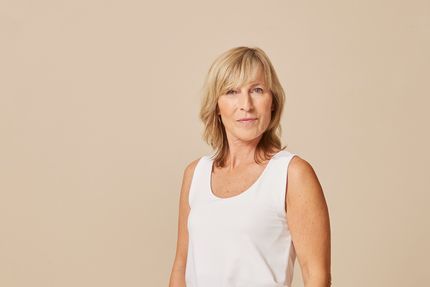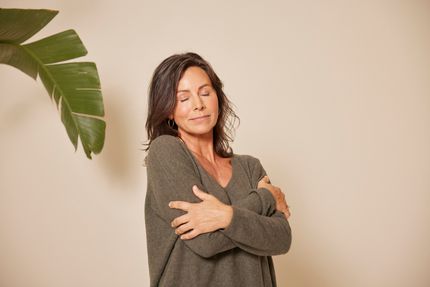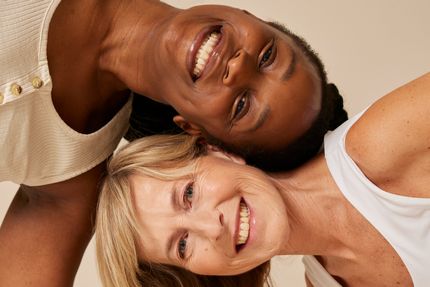Skin ageing and menopause
The skin is the body's largest organ: it weighs about 15 percent of total body weight. Oestrogen and collagen, in particular, keep the skin strong and healthy. As hormone levels drop during menopause, the skin becomes thinner, drier and will start to sag. Lifestyle adjustments and dietary supplements can slow down the rate of skin ageing.

Dry skin, wrinkles, fine lines. It doesn’t get better no matter how much cream I use. - Monique (age 55)

Many women notice that their skin gets drier, thinner, saggier and more wrinkly around menopause. Some women may experience prickling or tingling, or their skin may take longer to heal. Menopausal skin changes such as eczema and acne are also common.
In early menopause, skin collagen levels decrease fairly rapidly. The result is a decrease in the skin's thickness and elasticity. Just like the rest of our body, your skin evolves too, becoming thinner and saggier with each passing year (at about the same rate as the rate of bone loss). This decline accelerates after menopause: in postmenopausal women skin thickness decreases by 1.13 percent and collagen levels by 2.1 percent annually.
What is happening in your body?
Did you know oestrogen and collagen both play a big role in keeping your skin healthy? Oestrogen stimulates the production of collagen, an indispensable building block (protein) for healthy, firm skin. Other parts of the body, such as muscles, joints and bones, also need collagen to function properly.
Collagen makes tissues strong and resilient, able to withstand stretching. When oestrogen decreases, the collagen in your skin decreases along with it. The result? Your skin becomes thinner, more wrinkly and fragile, and more susceptible to external aggressors. Collagen also helps the skin retain water. Less collagen, therefore, means less hydrated skin.
Oestrogen helps regulate the enzymes that break down collagen, so when oestrogen levels decline, the enzymes that break down collagen can become more active, leading to a faster breakdown of collagen in the skin.
In addition, sebaceous glands, which keep the skin supple and protect it from drying out, produce less oil as you age. Men experience a minimal decrease. Women, however, gradually produce less oil beginning after menopause. This can make it harder to keep the skin moist, resulting in dryness and itchiness.
Other factors
In addition to the decline in hormones, ageing also plays a major role: in fact, skin ageing begins as early as around the age of 25 years. Other factors, such as smoking, alcohol, sun exposure and lack of sleep, have also been shown to affect collagen production and cause skin damage and ageing.
Research shows that at least 80 percent of visible skin ageing is caused by the sun. Always use sunscreen with an SPF 30 or higher if you're going to be in the sun for more than 20 minutes.
Stress (which women are more sensitive to during menopause) is also a trigger for skin problems such as eczema, acne and skin ageing. This is because the stress hormone cortisol breaks down collagen, accelerating the ageing process.
Menopause can also cause other symptoms besides skin changes, such as hair loss, sleep problems and urinary tract infections.
What is the function of skin?
The skin consists of three layers: the epidermis, the dermis and the subcutaneous connective tissue. It's probably not something you think about often, but the skin serves many important functions, including:
- It protects against injuries, pathogens and harmful substances
- It protects against UV radiation from the sun
- It is important for the production of Vitamin D
- It assists in maintaining water balance in the body
- It acts as a sense organ (it enables tactile sensations)
- It regulates body temperature
What can you do?
As you age, your skin ages too. Menopause accelerates this process. It's important to take care of your skin through eating healthily, adopting effective skin care routines and minimising stress (lower cortisol means less collagen breakdown and better skin).
- Eat a healthy and varied diet with plenty of essential fatty acids. Scientific research into the human body has closely linked nutrition and eating habits to skin health. To be healthy, you need to eat a rainbow diet (colourful fruits and vegetables) as well as foods that are rich in omega-3, such as chia seeds, walnuts and oily fish. Supplements, such as algae or fish oil supplements, can help enrich your overall health.
- Stop smoking and limit your alcohol intake. There is an overwhelming amount of scientific evidence that links smoking and alcohol consumption to facial ageing. The more a person smokes, the greater the risk. The same applies to drinking alcohol: too much alcohol extracts moisture from the skin and disrupts the production of collagen.
- Improve your digestion. A healthy gut flora is largely responsible for skin health. Improve your digestion by eating a lot of fibre (30 grams a day), fermented products and green leafy vegetables.
- Always protect your skin from the sun. Sun damage is one of the biggest factors causing premature skin ageing. Therefore, dermatologists recommend that you always apply sunscreen of at least SPF 30 to protect your skin from UV damage before venturing outdoors.
- Nourish your skin with skin care products. Avoid skin care products with fragrances and alcohol (they will only dry out your skin more) and opt for products that contain proven effective ingredients, such as retinol (Vitamin A), collagen, squalane, hyaluronic acid, niacinamide, Vitamin C and/or Vitamin E.
Your path to a smooth menopause starts here
Get the tools you need to navigate menopause with more ease and to educate yourself about your body. With tips and insights from experts, and relatable stories of women just like you. Press play, not pause.
What treatments can help with skin ageing?
This may sound like a cliché, but good skin comes from within. A healthy diet is essential for keeping your skin strong and vibrant. Supplements can support skin health and radiance.

I started noticing changes within a few weeks of taking a collagen supplement. My hands, face and neck look smoother. - Radha (age 46)

Can hormone therapy help?
Hormone replacement therapy (HRT) is used to treat severe menopausal symptoms like hot flashes, night sweats and sleep problems by replacing hormones that are lost during menopause. HRT is not prescribed to slow down skin ageing. Do you have other symptoms as well, such as severe hot flashes or night sweats (vasomotor symptoms)? Then hormone therapy might be an option for you.
Sources
- Raine-Fenning NJ, Brincat MP, Muscat-Baron Y. (2003). Skin aging and menopause : implications for treatment. PMID: 12762829.
- Nair PA. (2014). Dermatosis associated with menopause. J Midlife Health. PMID: 25540566.
- Northwestern Medicine. Riley JM. (2022). Menopause and Your Skin. https://www.nm.org/healthbeat/healthy-tips/menopause-and-your-skin
- Lopez-Ojeda W, Pandey A, Alhajj M, et al. (2022). Anatomy, Skin (Integument) https://www.ncbi.nlm.nih.gov/books/NBK441980/
- Just M, Ribera M, Monsó E, Lorenzo JC, Ferrándiz C. (2007). Effect of smoking on skin elastic fibres: morphometric and immunohistochemical analysis. PMID: 17199572.
- Goodman GD, Kaufman J, Day D, Weiss R, Kawata AK, Garcia JK, Santangelo S, Gallagher CJ. (2019). Impact of Smoking and Alcohol Use on Facial Aging in Women: Results of a Large Multinational, Multiracial, Cross-sectional Survey. PMID: 31531169.
- Zouboulis CC, Blume-Peytavi U, Kosmadaki M, Roó E, Vexiau-Robert D, Kerob D, Goldstein SR. (2022). Skin, hair and beyond: the impact of menopause. PMID: 35377827.
- Michalak M, Pierzak M, Kręcisz B, Suliga E. (2021). Bioactive Compounds for Skin Health: A Review. PMID: 33445474.
- Harvard T.H. Chan School of Publiec Health. (2021). Collagen. https://hsph.harvard.edu/department/nutrition/
- Flament F, Bazin R, Laquieze S, Rubert V, Simonpietri E, Piot B. (2013). Effect of the sun on visible clinical signs of aging in Caucasian skin. PMID: 24101874.
Tips and advice


FAQ
What supplements are good for healthy skin?
Nutrients in your diet have a major impact on your skin. Alongside a healthy diet, taking certain supplements can help keep your skin healthy. In addition to collagen, Vitamins A, C and E, selenium, copper, zinc, silicon, polyphenols, carotenoids and unsaturated fatty acids are known to help improve skin health and elasticity. Zinc and Vitamin C (ascorbic acid), among other nutrients, are needed to stimulate the production of collagen.












